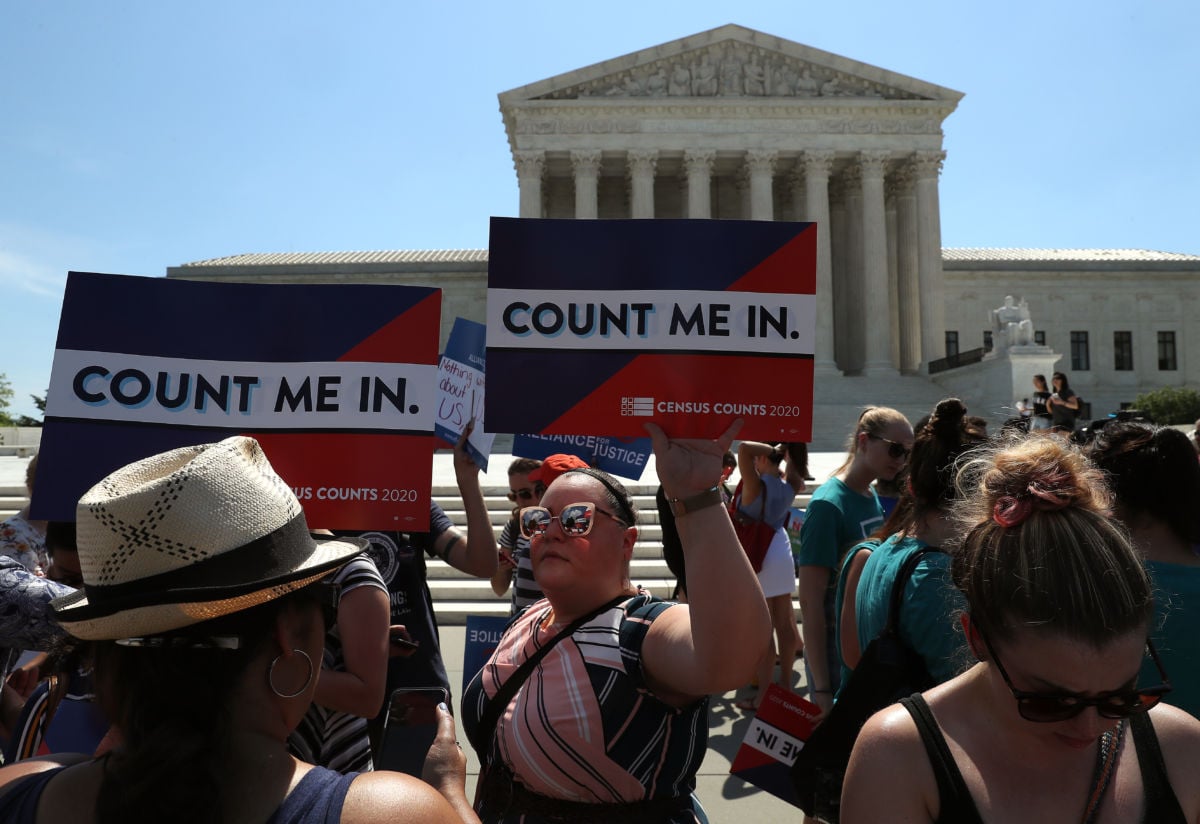Part of the Series
Human Rights and Global Wrongs
Honest, paywall-free news is rare. Please support our boldly independent journalism with a donation of any size.
In a surprise decision, Chief Justice John Roberts, joined by the four liberal members of the Supreme Court — Justices Ruth Bader Ginsburg, Stephen Breyer, Elena Kagan and Sonia Sotomayor — halted the Trump administration’s plans, at least temporarily, to add a citizenship question to the 2020 census.
The Court thought the stated motive for adding the question seemed “contrived,” and sent the case, Department of Commerce v. New York, back to the federal district court to review whether the government can come up with a legally acceptable rationale for adding the citizenship question.
After oral arguments in April, it appeared the justices were poised to allow the Trump administration to add this question to the census: “Is this person a citizen of the United States?” That question would deter households with undocumented residents from responding to the census.
The Census Department estimated that 6.5 million people could be uncounted if the question was added. This is significant because the census is used to determine the number of seats each state gets in the House of Representatives, the number of Electoral College votes each state will have in the presidential elections starting in 2024, and how $900 billion in annual federal funds will be distributed to the states for health care, hospitals, schools and infrastructure for the next decade.
The plaintiffs in this case — a coalition of states, counties and cities — are claiming that the addition of the question is unconstitutional.
On May 30, the high court received newly discovered evidence of a cover-up of an illegal racist motive for adding the citizenship question. Thomas Hofeller was a Republican strategist and architect of the citizenship question strategy. After he died in 2018, Hofeller’s daughter found documents revealing that he urged the question be added to the census because it would “be a disadvantage to the Democrats” and “advantageous to Republicans and Non-Hispanic Whites” in redistricting.
Roberts and the four liberal justices found that the reason Secretary of Commerce Wilbur Ross gave for adding the question to the census “seems to have been contrived.” Ross testified before Congress that the sole reason he and the Department of Justice (DOJ) sought to add the question was to better enforce the Voting Rights Act (VRA).
“[W]e share the District Court’s conviction that the decision to reinstate a citizenship question cannot be adequately explained in terms of DOJ’s request for improved citizenship data to better enforce the VRA,” Roberts wrote. “Altogether, the evidence tells a story that does not match the explanation the Secretary gave for his decision.”
Breyer noted in his concurrence, “[T]he consequences of mistakes in the census count, of even a few hundred thousand, are grave. Differences of a few thousand people, as between one State and another, can mean a loss or gain of a congressional seat—a matter of great consequence to a State…. And similar small differences can make a large difference to the allocation of federal funds among competing state programs.”
Trump called the Court’s decision “totally ridiculous,” tweeting that he asked his lawyers to “delay the Census, no matter how long, until the United States Supreme Court is given additional information from which it can make a final and decisive decision on this very critical matter.”
Although it is theoretically possible the question could still be added in time for the 2020 census, it is highly unlikely, given the July 1 printing deadline.
Last week, the Justice Department told the Court that the deadline could be extended to October 31. But The New York Times quoted experts as saying, “the printing work is so vast — more than a billion pieces of paper — and such a logistical tangle that the bureau’s ability to put off its start is measured in weeks, not months.”
A former senior bureau official told the Times, “You’d really be putting the operational plan at great risk if this stretches into mid-August. You may not have a census at all in 2020.”
Meanwhile, a different case pending before U.S. District Judge George Hazel in Maryland could block the inclusion of the citizenship question in the census. On June 25, in light of the new Hofeller evidence, a panel of the Fourth Circuit U.S. Court of Appeals sent a case back to Hazel to decide if there was discriminatory intent behind the citizenship question and thus a violation of the Equal Protection Clause of the Constitution. One of the panel judges suggested that Hazel issue an injunction to stop the question from being included in the census until the case was resolved. This is a different issue than the one in Department of Commerce v. New York.
The opinion by Roberts and the liberal justices is significant as it confronts the Trump administration’s false justification for adding the citizenship question. As Sen. Bernie Sanders tweeted, “Trump lied about his motivations, and five justices called him on it. His proposal to add a citizenship question to the census was nothing but a racist attempt to disenfranchise communities of color.”
Trump is silencing political dissent. We appeal for your support.
Progressive nonprofits are the latest target caught in Trump’s crosshairs. With the aim of eliminating political opposition, Trump and his sycophants are working to curb government funding, constrain private foundations, and even cut tax-exempt status from organizations he dislikes.
We’re concerned, because Truthout is not immune to such bad-faith attacks.
We can only resist Trump’s attacks by cultivating a strong base of support. The right-wing mediasphere is funded comfortably by billionaire owners and venture capitalist philanthropists. At Truthout, we have you.
Truthout has launched a fundraiser to raise $41,000 in the next 7 days. Please take a meaningful action in the fight against authoritarianism: make a one-time or monthly donation to Truthout. If you have the means, please dig deep.
